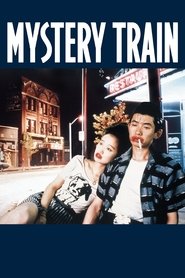No TV?
Much of our time is spent in the vicinity of the hotel, […] the kind of place that might have inspired […] Edward Hopper and Robert Frank. (The compositions and colors in Mystery Train are as controlled as in Hopper: breaking from the black and white of his previous two films, Jarmusch and his regular cinematographer, Robby Müller, work in a limited palette of blues, grays, and greens, with stylized bursts of red.)[…]
It’s no detriment to Mystery Train—and in fact makes a kind of theoretical sense—that Jarmusch had never been to Memphis before he came up with the idea for the movie. Many of his characters find themselves having to decipher an alien environment, and it’s telling that some of them rely on old frames of reference.
[…]
Multistrand movies have proliferated in the two decades since Mystery Train, and it’s almost shocking to see how little Jarmusch’s wise, unassuming film ultimately has in common with the sleight-of-hand flamboyance of Pulp Fiction or the reductive fraudulence of Babel and Crash, which yank their narrative threads together in the hope of producing grand, unified theories of the human condition. Jarmusch isn’t remotely interested in convergence. Quite the opposite, in fact. When strangers become aware of one another in Mystery Train, the connections are all the more melancholy for being transient, partial, matter-of-fact.
— Dennis Lim (Criterion)
Synopsis: In Memphis, Tennessee, over the course of a single night, the Arcade Hotel, run by an eccentric night clerk and a clueless bellboy, is visited by a young Japanese couple traveling in search of the roots of rock; an Italian woman in mourning who stumbles upon a fleeing charlatan girl; and a comical trio of accidental thieves looking for a place to hide.

